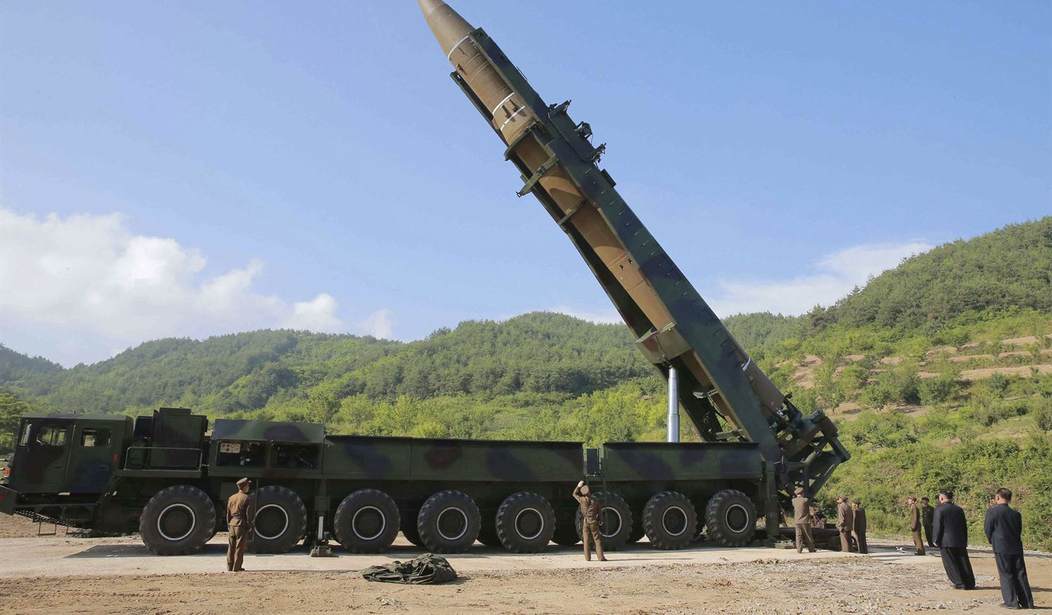Something bad happened this morning in Asia. Yes, that’s not exactly shocking news in and of itself, since bad things seem to be happening all over the planet on a daily basis lately, but this event was particularly worrisome. For the past ten days, North Korea has been test-firing missiles in response to joint military exercises held by South Korea and the United States. The last four missiles all fell into the sea between North Korea and Japan. But this morning’s launch featured an ICBM with a considerably longer range and it flew over Japan before entering the water in the Pacific further to the east. This represents one of the most provocative moves by Kim Jong-un in recent memory and the launch caused shutdowns and evacuations in Japan. This launch could arguably be considered an act of war. (Associated Press)
North Korea on Tuesday fired a ballistic missile over Japan, its neighbors said, escalating tests of weapons designed to strike key targets in regional U.S. allies amid stalled nuclear diplomacy.
The Japanese prime minister’s office said at least one missile fired from North Korea flew over Japan and was believed to have landed into the Pacific Ocean.
It said authorities have issued an alert to residents in northeastern regions to evacuate buildings nearby in what was reportedly the first such alert in five years.
Standard rules of engagement inform us that any time a foreign nation flies any sort of craft through the restricted airspace over another country without permission it can be considered an act of war. The violated country is entitled to respond by attempting to shoot down the craft and the possibility of military action against the offending nation is in play. In other cases, the violated country can seek fines and other penalties through an international court. (Not that Kim Jong-un is likely to pay up.)
We have mostly been able to ignore Kim’s antics with all of his test launches up until now because they’ve either landed in the ocean or experienced failures and fell back to earth in his own country. But this launch was an obvious provocation that should not be ignored. Japan is an American ally and we have a responsibility to help them defend themselves.
Have we given Japan any sort of missile defense technology similar to the Iron Dome in Israel? In fact, we have. More than five years ago, Japan began installing two American Aegis Ashore missile-defense systems on its home islands specifically in response to the North Korean missile threat. They briefly canceled the plan in 2020 before resuming work roughly six months later. They have also added the Patriot Advanced Capability-3 (PAC-3) system to their arsenal. In support of those systems, they developed the Japan Aerospace Defense Ground Environment (JADGE). This system of combined radar, satellite, and ship-based communication networks is supposed to be able to detect incoming missiles and shoot them out of the sky.
So what happened with this launch? Did Japan’s defensive systems simply fail or did they hesitate to pull the trigger and shoot Kim’s missile down? Either possibility is alarming, though it might be understandable if they feared provoking North Korea into an actual attack. As our ally, the United States should quietly let Japan know that we have their back and they should feel free to blow up Kim’s missiles any time they encroach on Japan’s airspace.
Would that lead to war? Most analysts don’t think so. While North Korea has clearly become more dangerous under the rule of its diminutive dictator’s family, most of Kim’s antics are seen as bluster and an effort to be taken seriously on the world stage. If he actually attacked anyone his country would be lost in very short order. But that doesn’t mean that this sort of activity should be tolerated. Having a few of his missiles shot down might be just the lesson Kim Jong-un needs to learn.









Join the conversation as a VIP Member